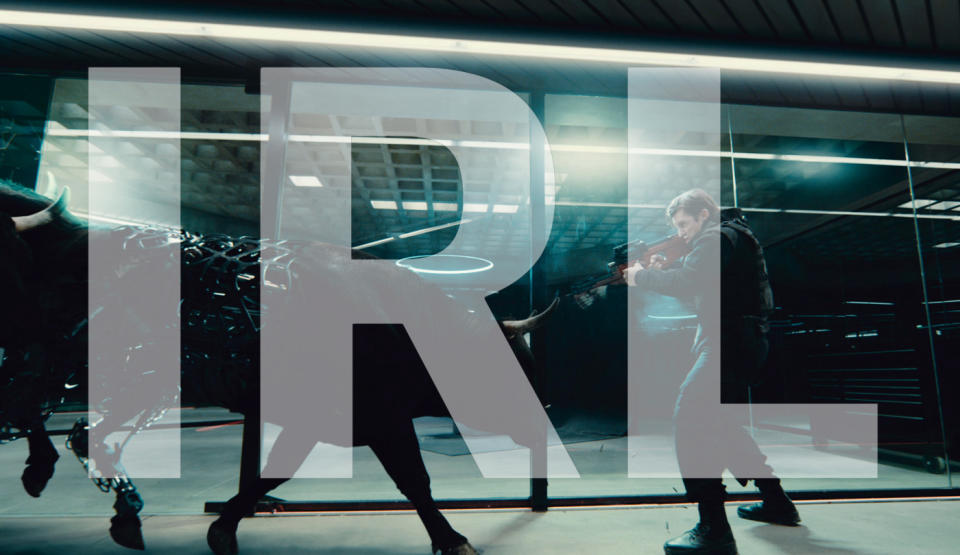What we're watching: 'The Good Place' and 'Westworld'
They have more in common than you might think.
This week's IRL focuses on two shows that don't appear to have much in common. But now Westworld viewers may be able to find a new appreciation for The Good Place, at least until season 3 rolls around. (Warning: spoilers ahead.)
The Good Place

Cherlynn Low
Reviews Editor
The Good Place is a Good Show. This much most people have already heard. It has a unique concept and a clever plot driven by some insane and insanely endearing characters. You'll come for Ted Danson's charm and Kristen Bell's quirky realness but stay for the fresh, unexpectedly talented rest of the cast. I'll admit I'm late to discover the series (as I am with most things), but hey, better late than never.
It's not just a Good Show, by the way. This is a Great Show. Because it deals so much with morality (and mortality), The Good Place not only keeps me hooked but also makes me question how I'm even living my life. Granted, I'm already an overthinker, so it doesn't take much to keep me up at night. But watching the characters struggle to be good forces me to consider whether I could be doing better and whether there's a point to all of it. What lies beyond our world? How are our actions being evaluated, and by whom? Does any of it matter?
If you like your comedy with a generous helping of philosophy, this is the show for you. And even if you don't want to entertain such deep thoughts, The Good Place is a fun ride that has a good dose of laughs and an ultimately optimistic viewpoint that can cheer you up on a dull weekend.
Westworld

Richard Lawler
Senior News Editor
We should've seen this coming. At the end of its first season, Westworld seemed to resolve a major mystery ("What is the maze, and where is its center?") in a bloody robot uprising. But then it presented a new challenge in the behavior of a host playing the town madam, who came within steps of escape, only to turn back and pursue her "daughter" from an old script.
In season 2, the show brought back most of the main players (even if they were dead -- some things don't quite stick in Westworld) and moved on to what's next. My issue is that I never felt like it answered the questions initially posed about consciousness and autonomy. Sure, leaving things somewhat open-ended is great for Reddit threads, but putting all the strings on the board and failing to connect them left me cold.
Now the show suddenly moves on to the question (as its writer put it in an interview) of "Who is more programmable?" A question that is eventually resolved in a single, mostly unexplained line of dialogue delivered by a character who didn't exist before the last episode. Sure, it's an answer -- human consciousness can apparently be coded just like a player piano, and with surprisingly few notes -- but the process to get there is missing. Instead, we got a full episode devoted to the one smart device that can run for ten years without rebooting, all as it moved on a quest to find "the valley beyond."
The valley itself, once discovered, undid any emotional impact of season 1. If the destiny of all but a few hosts is to essentially die and never experience the outside world, even a conveniently placed device that sends them to the glorious robot afterlife doesn't feel like a fitting resolution for experiencing consciousness and free will. They still didn't get to choose their end, and instead had it selected for them at the whim of a fellow host, only to end up (for now, at least) trapped in a new, significantly less dangerous, virtual version of the park.
The other big issue season 2 addressed is the inherent privacy flaw. It should've made the park an unworkable idea, but for some reason, in this post-Facebook world, no visitor seems to have considered that their activities will be tracked. The park had enough data to create copies of everyone who had ever visited, and now that data is ... somewhere?
The show will go on -- complete with unmatched cinematography and a cast capable of out-acting anything else that's hit my TV screen lately -- and there will inevitably be ten more questions for every answer given in season 3. While the theorists will have their itch for investigations scratched (how many of you figured out that post-credit scene without some help from interviews?), those looking for greater depth in this series will likely have the football snatched away once again, teased with mystery after mystery until the allure wanes.
"IRL" is a recurring column in which the Engadget staff run down what they're buying, using, playing and streaming.




